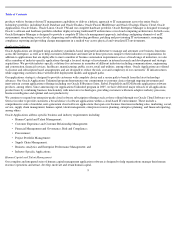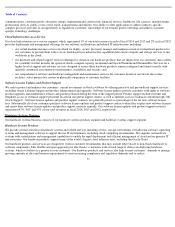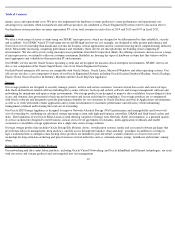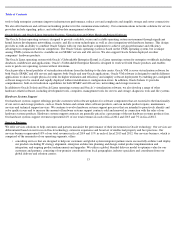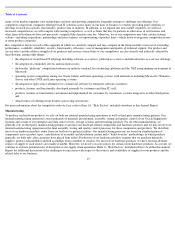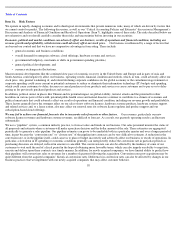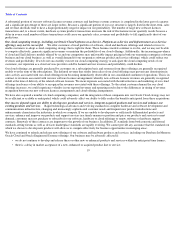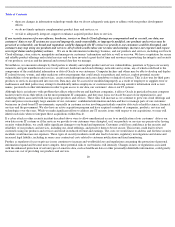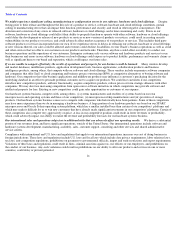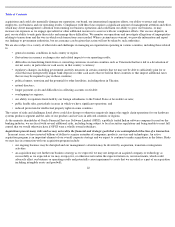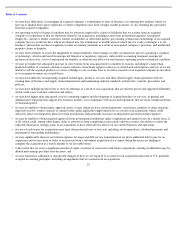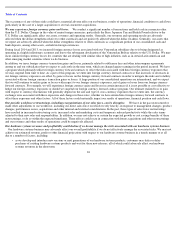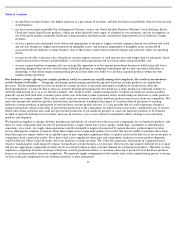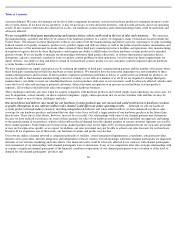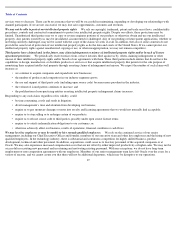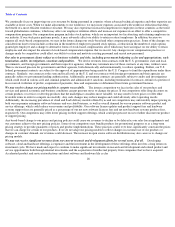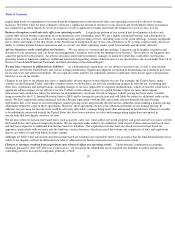Oracle 2013 Annual Report Download - page 23
Download and view the complete annual report
Please find page 23 of the 2013 Oracle annual report below. You can navigate through the pages in the report by either clicking on the pages listed below, or by using the keyword search tool below to find specific information within the annual report.
Table of Contents
A substantial portion of our new software licenses revenue contracts and hardware systems contracts is completed in the latter part of a quarter
and a significant percentage of these are larger orders. Because a significant portion of our cost structure is largely fixed in the short-term, sales
and revenue shortfalls tend to have a disproportionately negative impact on our profitability. The number of large new software licenses
transactions and, to a lesser extent, hardware systems products transactions increases the risk of fluctuations in our quarterly results because a
delay in even a small number of these transactions could cause our quarterly sales, revenues and profitability to fall significantly short of our
predictions.
Our cloud computing strategy, including our Oracle Cloud Software-as-a-Service, Platform-as-a-Service and Infrastructure-as-a-Service
offerings, may not be successful. We offer customers a broad portfolio of software, cloud and hardware offerings and related services to
enable customers to adopt a cloud computing strategy that is right for them. These business models continue to evolve, and we may not be able
to compete effectively, generate significant revenues or maintain the profitability of our cloud offerings. Additionally, the increasing prevalence
of cloud and SaaS delivery models offered by us and our competitors may unfavorably impact pricing in both our on-
premise enterprise software
business and our cloud business, as well as overall demand for our on-premise software product and service offerings, which could reduce our
revenues and profitability. If we do not successfully execute our cloud computing strategy or anticipate the cloud computing needs of our
customers, our reputation as a cloud services provider could be harmed and our revenues and profitability could decline.
Our cloud offerings are generally purchased by customers on a subscription basis and revenues from these offerings are generally recognized
ratably over the term of the subscriptions. The deferred revenue that results from sales of our cloud offerings may prevent any deterioration in
sales activity associated with our cloud offerings from becoming immediately observable in our consolidated statement of operations. This is in
contrast to revenues associated with our new software licenses arrangements whereby new software licenses revenues are generally recognized
in full at the time of delivery of the related software licenses. We incur expenses associated with the infrastructures and marketing of our cloud
offerings in advance of our ability to recognize the revenues associated with these offerings. To the extent customer demand for our cloud
offerings increases, we could experience volatility in our reported revenues and operating results due to the differences in timing of revenue
recognition between our new software licenses arrangements and cloud offering arrangements.
We have also acquired a number of cloud computing companies, and the integration of these companies into our Oracle Cloud strategy may not
be as efficient or scalable as anticipated, which could adversely affect our ability to fully realize the benefits anticipated from these acquisitions.
Our success depends upon our ability to develop new products and services, integrate acquired products and services and enhance our
existing products and services. Rapid technological advances and evolving standards in computer hardware and software development and
communications infrastructure, changing and increasingly sophisticated customer needs and frequent new product introductions and
enhancements characterize the industries in which we compete. If we are unable to develop new or sufficiently differentiated products and
services, enhance and improve our products and support services in a timely manner or position and price our products and services to meet
demand, customers may not purchase or subscribe for our software, hardware or cloud offerings or renew software or hardware support
contracts. Renewals of these contracts are important to the growth of our business. In addition, IT standards from both consortia and formal
standards-setting forums as well as de facto marketplace standards are rapidly evolving. We cannot provide any assurance that the standards on
which we choose to develop new products will allow us to compete effectively for business opportunities in emerging areas.
We have continued to refresh and release new offerings of our software and hardware products and services, including our Database In-
Memory,
Oracle Cloud and Oracle Engineered Systems offerings. Our business may be adversely affected if:
19
•
we do not continue to develop and release these or other new or enhanced products and services within the anticipated time frames;
•
there is a delay in market acceptance of a new, enhanced or acquired product line or service;


